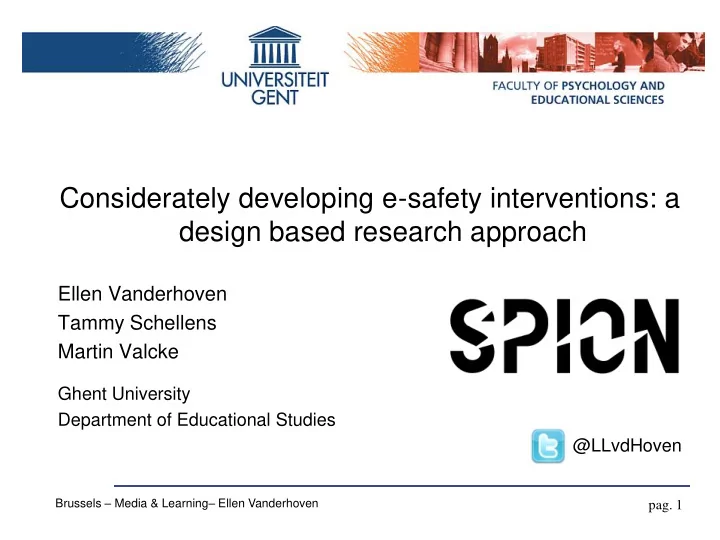

Considerately developing e-safety interventions: a design based research approach Ellen Vanderhoven Tammy Schellens Martin Valcke Ghent University Department of Educational Studies @LLvdHoven Brussels – Media & Learning – Ellen Vanderhoven pag. 1
‘New sneaky hat-trend on Facebook is pedophile-paradise ’ (ad.nl) Brussels – Media & Learning – Ellen Vanderhoven pag. 2
Brussels – Media & Learning – Ellen Vanderhoven pag. 3
Educational materials Nice and attractive Impact? Brussels – Media & Learning – Ellen Vanderhoven pag. 4
Design based research • Iterative analysis, design, development, and implementation • based on collaboration among researchers and practitioners • in real world settings • leading to contextually-sensitive design principles and theories (Wang & Hannafin, 2005). Brussels – Media & Learning – Ellen Vanderhoven pag. 5
Revision Analysis of Output: tips Developing Testing problem & tricks Brussels – Media & Learning – Ellen Vanderhoven pag. 6
Second phase: developing materials • Based on results first stage • Teacher manual + student syllabus • Short-term: one hour • Goal: • raising awareness • changing unsafe attitudes & behaviour Brussels – Media & Learning – Ellen Vanderhoven pag. 7
Developed materials • Structure 1) Introduction 2) Two-by-two exercise Simulated profile Scaffolding questions
Developed materials • Structure 1) Introduction 2) Two-by-two exercise Simulated profile Scaffolding questions 3) Class discussion 4) Voting cards
Developed materials • Structure: 1) Introduction 2) Two-by-two exercise Simulated profile Scaffolding questions 3) Class discussion 4) Voting cards 5) Examples + Theory
Revision Analysis of Output: tips Developing Testing problem & tricks Brussels – Media & Learning – Ellen Vanderhoven pag. 11
Third phase: Implementation & Evaluation PRETEST INTERVENTION POSTTEST course Online survey, Online survey, measuring: measuring: • Awareness • Awareness • Attitudes • Attitudes • Behaviour • Behaviour Brussels – Media & Learning – Ellen Vanderhoven pag. 12
Results first study • The course obtained its goal concerning raising awareness • Impact on behavior is limited Brussels – Media & Learning – Ellen Vanderhoven pag. 13
Revision Analysis of Output: tips Developing Testing problem & tricks Brussels – Media & Learning – Ellen Vanderhoven pag. 14
Design guidelines: what is important? • Collaborative learning (working with peers) • Authentic setting (e.g., real profile) • Positive relationships (e.g., with parents) • Sufficiently dosed (e.g., enough courses) What do you think? Brussels – Media & Learning – Ellen Vanderhoven pag. 15
What is important? • Collaborative learning individual reflection! • Authentic setting • Positive relationships • Sufficiently dosed Brussels – Media & Learning – Ellen Vanderhoven pag. 16
What is important? • Collaborative learning • Authentic setting Simulated profile sufficient • Positive relationships • Sufficiently dosed Brussels – Media & Learning – Ellen Vanderhoven pag. 17
What is important? • Collaborative learning Authentic setting • Positive relationships parental evenings not sufficient including parents using a homework task is beneficial for boys • Sufficiently dosed Brussels – Media & Learning – Ellen Vanderhoven pag. 18
What is important? • Collaborative learning Authentic setting • Positive relationships • Sufficiently dosed One course is enough to have a short- term impact on awareness and behaviour Brussels – Media & Learning – Ellen Vanderhoven pag. 19
Design guidelines: tips & tricks 1) Importance of individual reflection! 2) Simulated settings are sufficient to obtain goals. 3) Positive relationship with parents needs to be stimulated, by actively including them in the intervention (e.g., with homework task). 4) A short-term intervention is sufficient. Brussels – Media & Learning – Ellen Vanderhoven pag. 20
Conclusion • Importance of evaluation studies! • Design based research results in both design guidelines and practical solutions Brussels – Media & Learning – Ellen Vanderhoven pag. 21
Questions/remarks? Ellen.Vanderhoven@ugent.be Brussels – Media & Learning – Ellen Vanderhoven pag. 22
Recommend
More recommend